Презентация word-groups

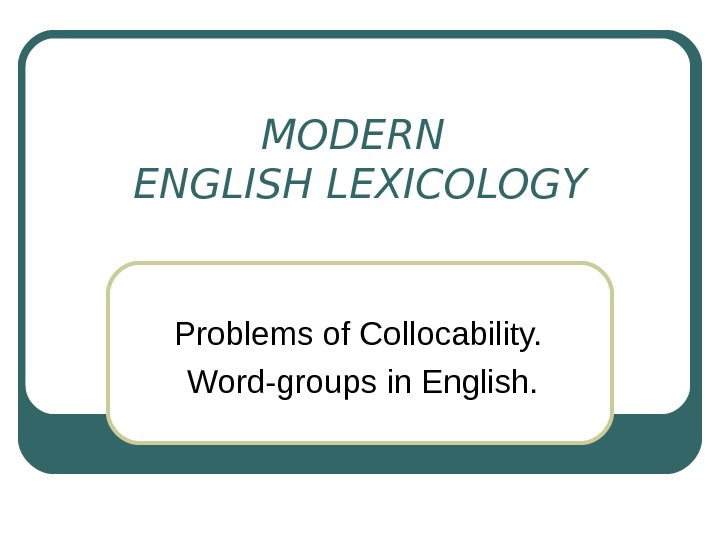
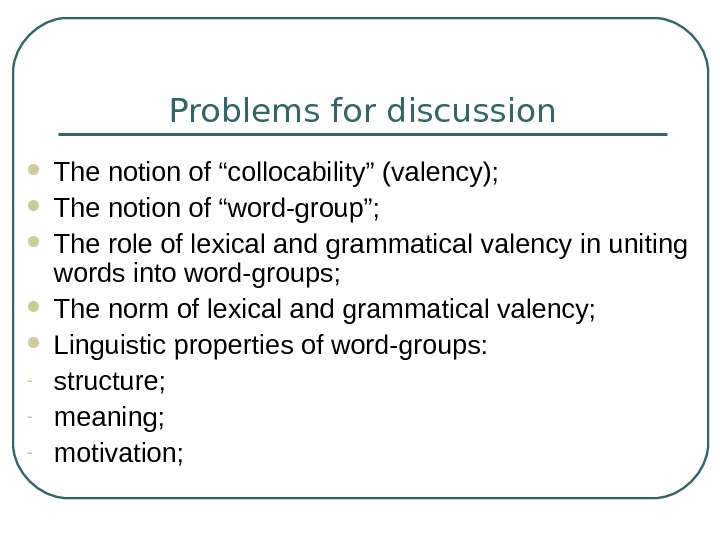
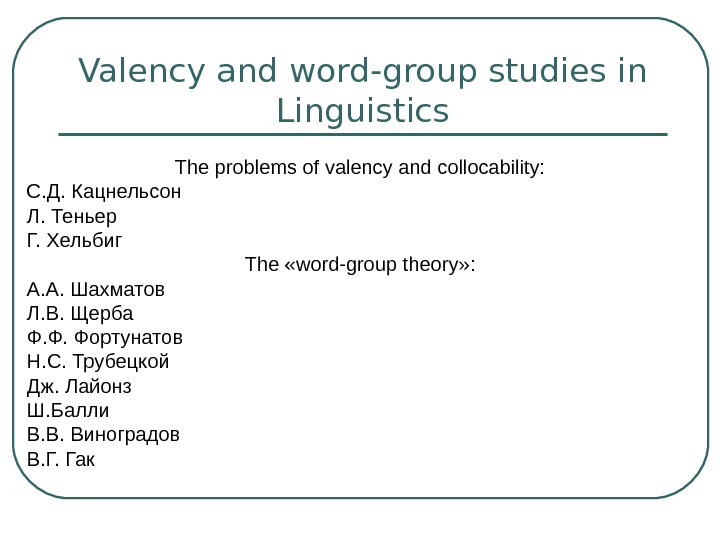
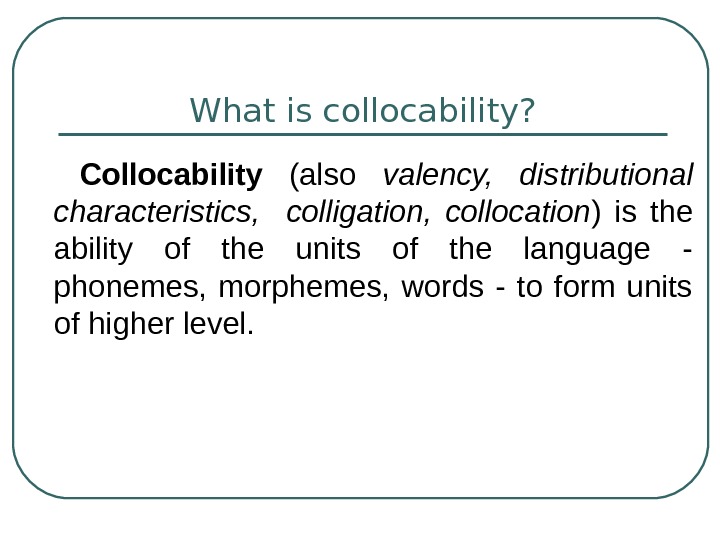
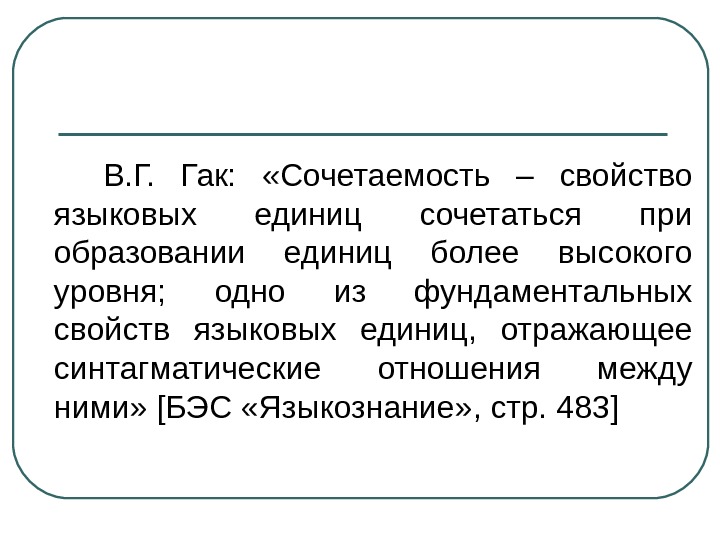

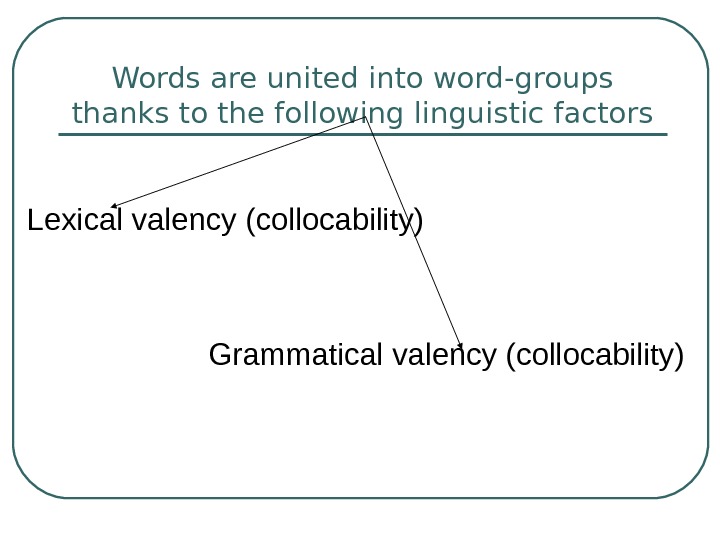
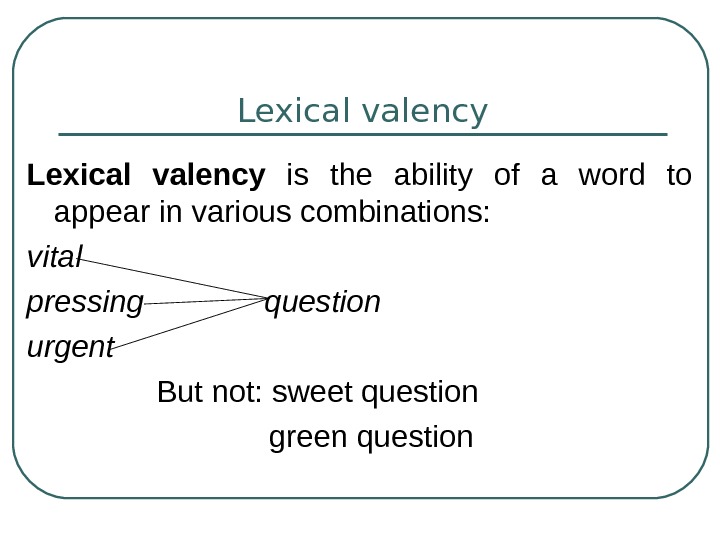
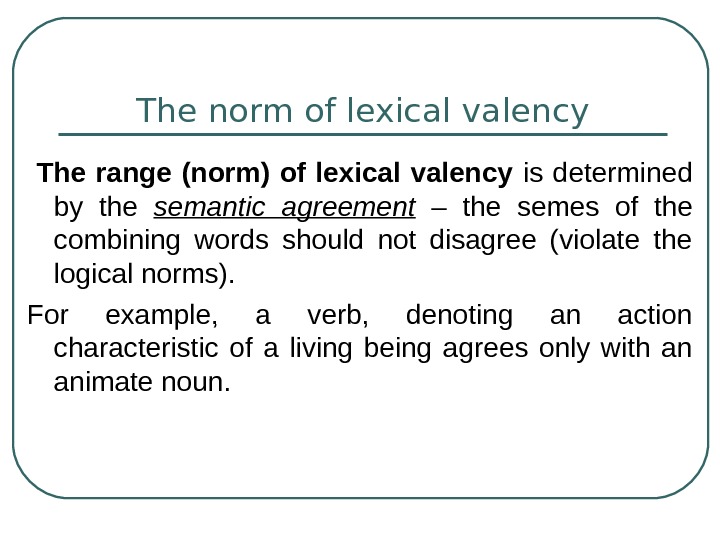
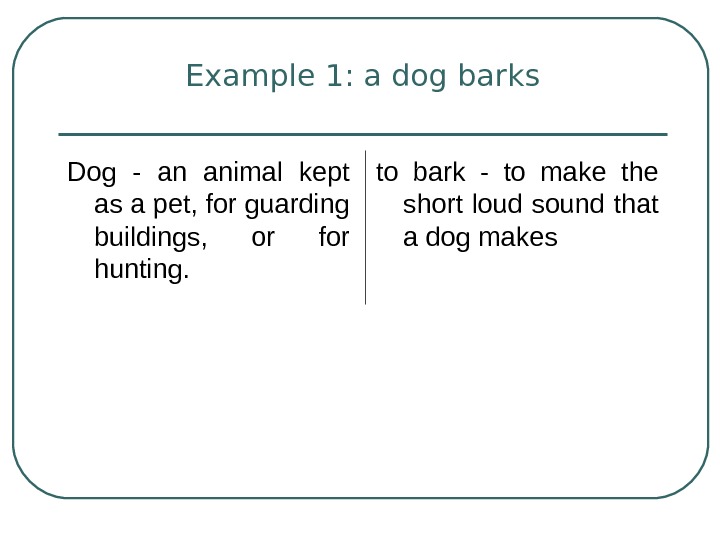
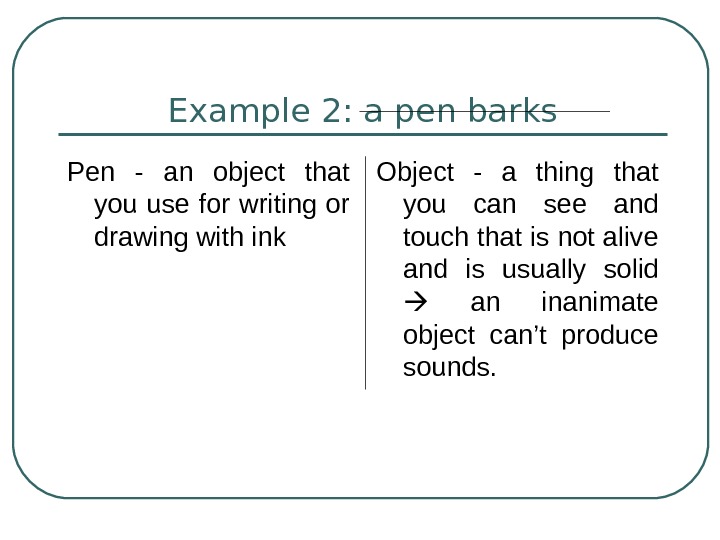
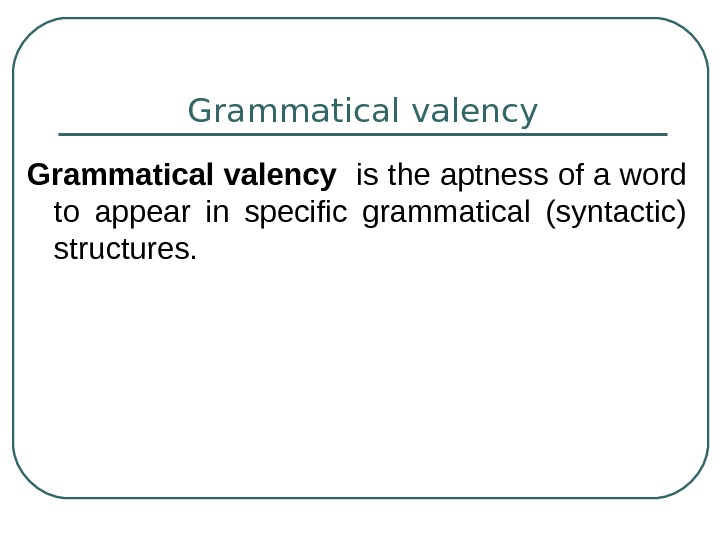
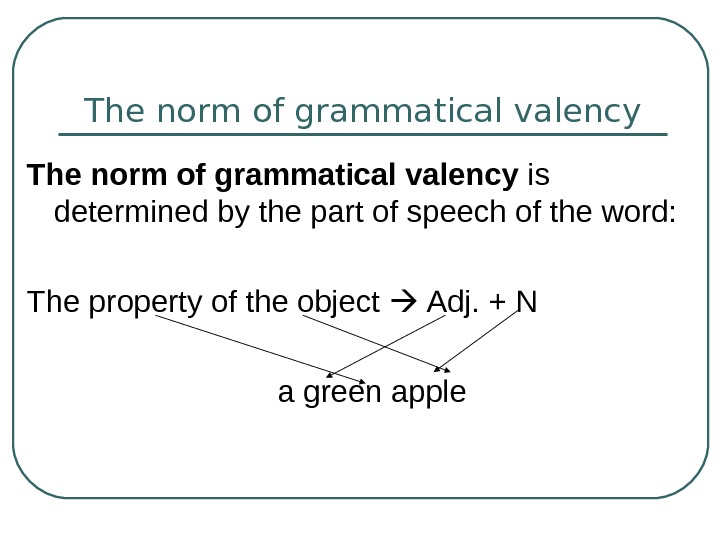
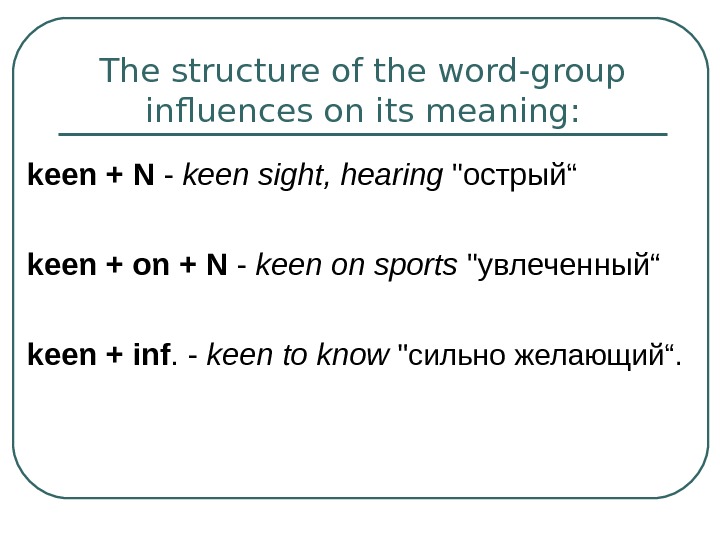
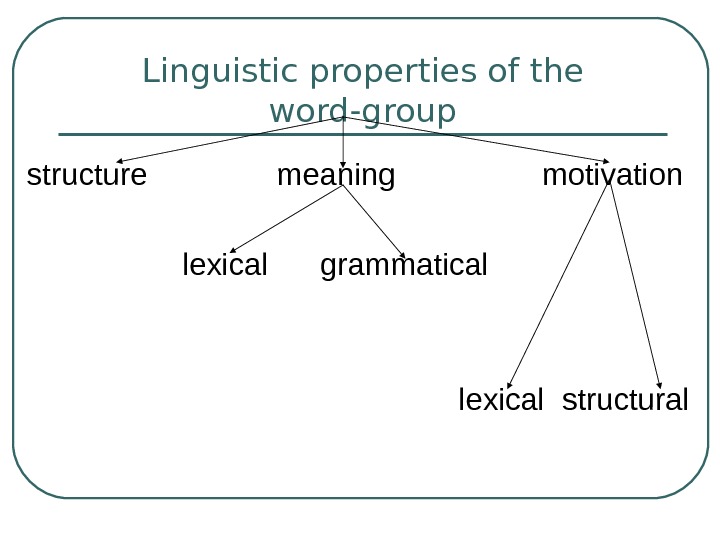
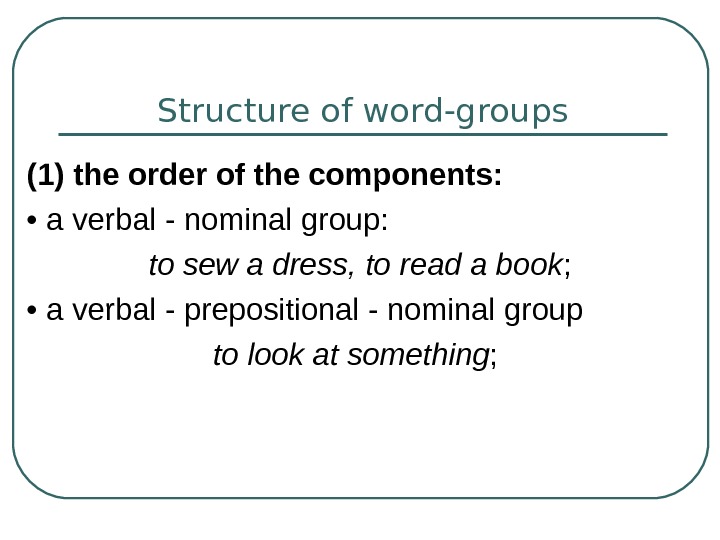
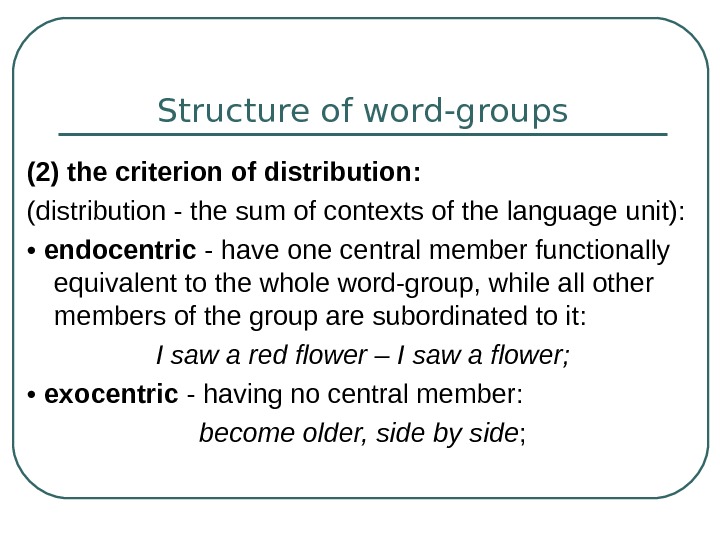
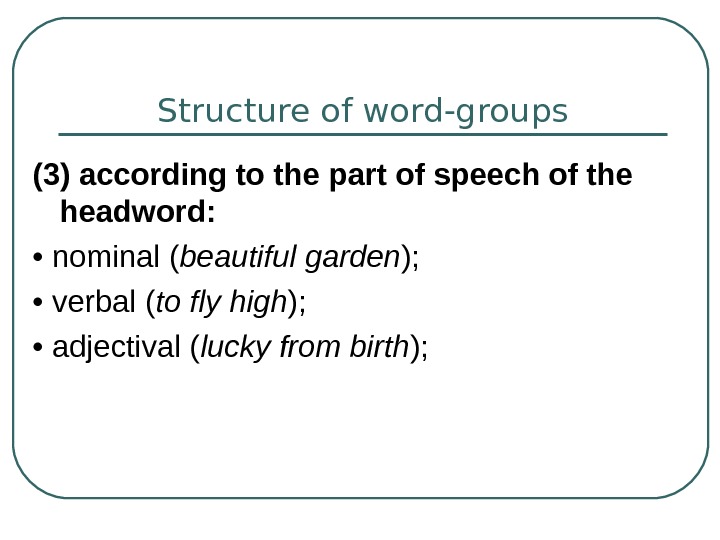
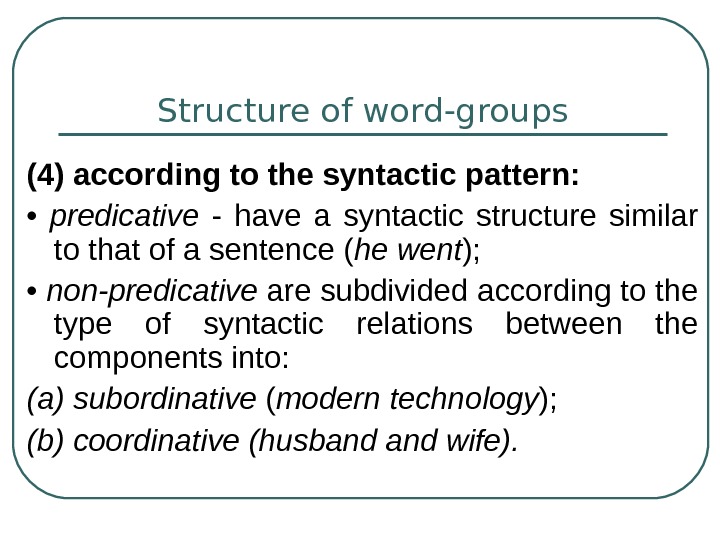

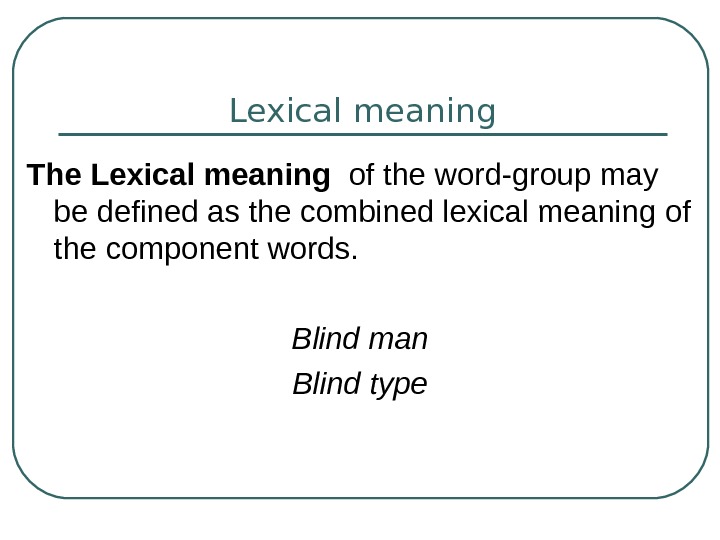
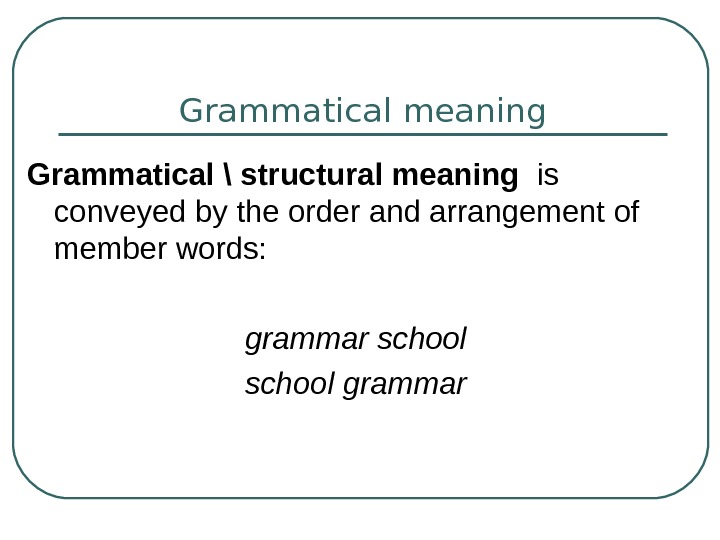
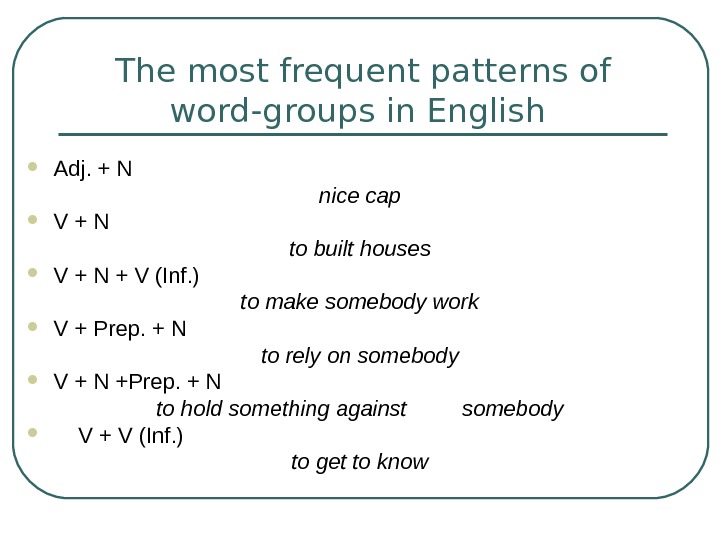
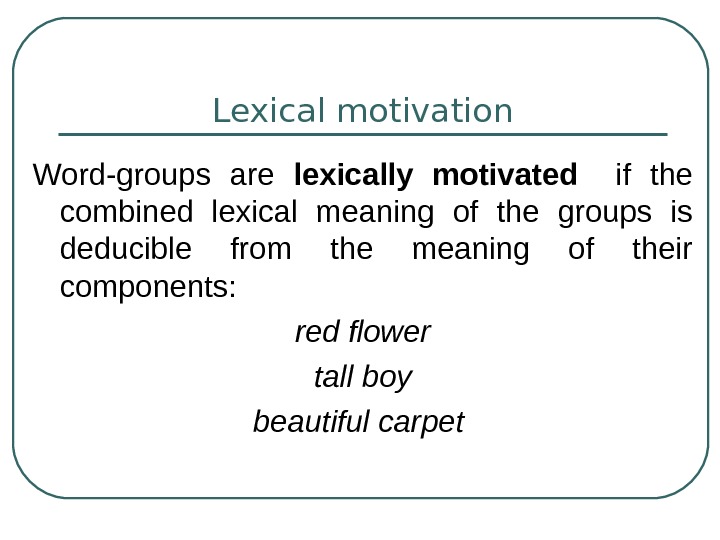
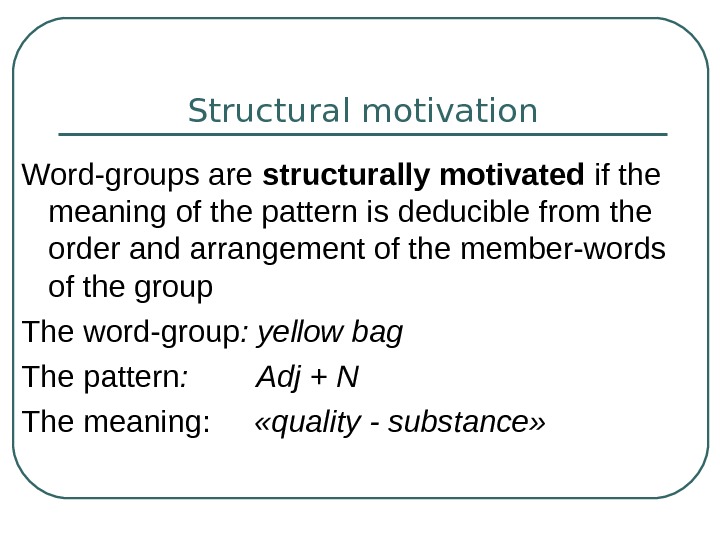
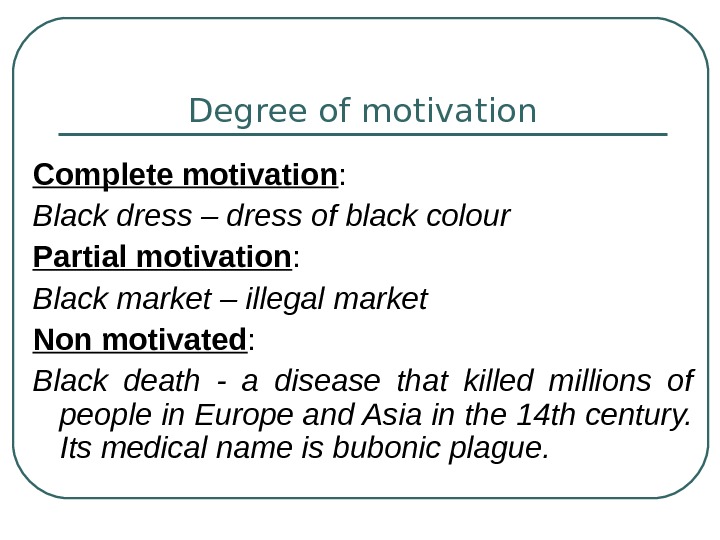
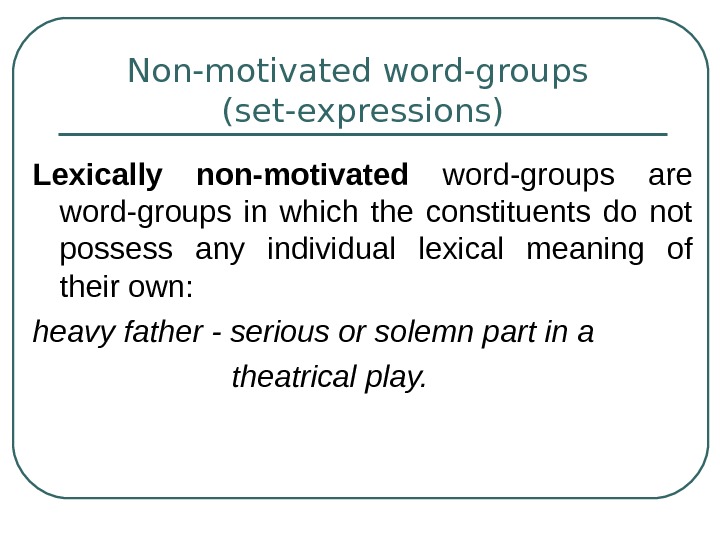
- Размер: 58 Кб
- Количество слайдов: 27
Описание презентации Презентация word-groups по слайдам
 MODERN ENGLISH LEXICOLOGY Problems of Collocability. Word-groups in English.
MODERN ENGLISH LEXICOLOGY Problems of Collocability. Word-groups in English.
 Problems for discussion The notion of “collocability” (valency); The notion of “word-group”; The role of lexical and grammatical valency in uniting words into word-groups; The norm of lexical and grammatical valency; Linguistic properties of word-groups: — structure; — meaning; — motivation;
Problems for discussion The notion of “collocability” (valency); The notion of “word-group”; The role of lexical and grammatical valency in uniting words into word-groups; The norm of lexical and grammatical valency; Linguistic properties of word-groups: — structure; — meaning; — motivation;
 Valency and word-group studies in Linguistics The problems of valency and collocability: С. Д. Кацнельсон Л. Теньер Г. Хельбиг The « word-group theory » : А. А. Шахматов Л. В. Щерба Ф. Ф. Фортунатов Н. С. Трубецкой Дж. Лайонз Ш. Балли В. В. Виноградов В. Г. Гак
Valency and word-group studies in Linguistics The problems of valency and collocability: С. Д. Кацнельсон Л. Теньер Г. Хельбиг The « word-group theory » : А. А. Шахматов Л. В. Щерба Ф. Ф. Фортунатов Н. С. Трубецкой Дж. Лайонз Ш. Балли В. В. Виноградов В. Г. Гак
 What is collocability? Collocability (also valency, distributional characteristics, colligation, collocation ) is the ability of the units of the language — phonemes, morphemes, words — to form units of higher level.
What is collocability? Collocability (also valency, distributional characteristics, colligation, collocation ) is the ability of the units of the language — phonemes, morphemes, words — to form units of higher level.
 В. Г. Гак: «Сочетаемость – свойство языковых единиц сочетаться при образовании единиц более высокого уровня; одно из фундаментальных свойств языковых единиц, отражающее синтагматические отношения между ними» [ БЭС «Языкознание» , стр. 483 ]
В. Г. Гак: «Сочетаемость – свойство языковых единиц сочетаться при образовании единиц более высокого уровня; одно из фундаментальных свойств языковых единиц, отражающее синтагматические отношения между ними» [ БЭС «Языкознание» , стр. 483 ]
 What is a word-group? A word group is the largest two facet lexical unit comprising more than one word. red tape beautiful girl to walk slowly
What is a word-group? A word group is the largest two facet lexical unit comprising more than one word. red tape beautiful girl to walk slowly
 Words are united into word-groups thanks to the following linguistic factors Lexical valency (collocability) Grammatical valency (collocability)
Words are united into word-groups thanks to the following linguistic factors Lexical valency (collocability) Grammatical valency (collocability)
 Lexical valency is the ability of a word to appear in various combinations: vital pressing question urgent But not: sweet question green question
Lexical valency is the ability of a word to appear in various combinations: vital pressing question urgent But not: sweet question green question
 The norm of lexical valency The range (norm) of lexical valency is determined by the semantic agreement – the semes of the combining words should not disagree (violate the logical norms). For example, a verb, denoting an action characteristic of a living being agrees only with an animate noun.
The norm of lexical valency The range (norm) of lexical valency is determined by the semantic agreement – the semes of the combining words should not disagree (violate the logical norms). For example, a verb, denoting an action characteristic of a living being agrees only with an animate noun.
 Example 1: a dog barks Dog — an animal kept as a pet, for guarding buildings, or for hunting. to bark — to make the short loud sound that a dog makes
Example 1: a dog barks Dog — an animal kept as a pet, for guarding buildings, or for hunting. to bark — to make the short loud sound that a dog makes
 Example 2: a pen barks Pen — an object that you use for writing or drawing with ink Object — a thing that you can see and touch that is not alive and is usually solid an inanimate object can’t produce sounds.
Example 2: a pen barks Pen — an object that you use for writing or drawing with ink Object — a thing that you can see and touch that is not alive and is usually solid an inanimate object can’t produce sounds.
 Grammatical valency is the aptness of a word to appear in specific grammatical (syntactic) structures.
Grammatical valency is the aptness of a word to appear in specific grammatical (syntactic) structures.
 The norm of grammatical valency is determined by the part of speech of the word: The property of the object Adj. + N a green apple
The norm of grammatical valency is determined by the part of speech of the word: The property of the object Adj. + N a green apple
 The structure of the word-group influences on its meaning: keen + N — keen sight, hearing «острый“ keen + on + N — keen on sports «увлеченный“ keen + inf. — keen to know «сильно желающий“.
The structure of the word-group influences on its meaning: keen + N — keen sight, hearing «острый“ keen + on + N — keen on sports «увлеченный“ keen + inf. — keen to know «сильно желающий“.
 Linguistic properties of the word-group structure meaning motivation lexical grammatical lexical structural
Linguistic properties of the word-group structure meaning motivation lexical grammatical lexical structural
 Structure of word-groups (1) the order of the components: • a verbal — nominal group : to sew a dress , to read a book ; • a verbal — prepositional — nominal group to look at something ;
Structure of word-groups (1) the order of the components: • a verbal — nominal group : to sew a dress , to read a book ; • a verbal — prepositional — nominal group to look at something ;
 Structure of word-groups (2) the criterion of distribution : ( distribution — the sum of contexts of the language unit): • endocentric — hav e one central member functionally equivalent to the whole word-group, while all other members of the group are subordinated to it : I saw a red flower – I saw a flower ; • exocentric — having no central member : become older, side by side ;
Structure of word-groups (2) the criterion of distribution : ( distribution — the sum of contexts of the language unit): • endocentric — hav e one central member functionally equivalent to the whole word-group, while all other members of the group are subordinated to it : I saw a red flower – I saw a flower ; • exocentric — having no central member : become older, side by side ;
 Structure of word-groups (3) according to the part of speech of the headword: • nominal ( beautiful garden ); • verbal ( to fly high ); • adjectival ( lucky from birth );
Structure of word-groups (3) according to the part of speech of the headword: • nominal ( beautiful garden ); • verbal ( to fly high ); • adjectival ( lucky from birth );
 Structure of word-groups (4) according to the syntactic pattern: • predicative — have a syntactic structure similar to that of a sentence ( he went ); • non-predicative are subdivided according to the type of syntactic relations between the components into: (a) subordinative ( modern technology ); (b) coordinative (husband wife).
Structure of word-groups (4) according to the syntactic pattern: • predicative — have a syntactic structure similar to that of a sentence ( he went ); • non-predicative are subdivided according to the type of syntactic relations between the components into: (a) subordinative ( modern technology ); (b) coordinative (husband wife).
 Meaning of word-groups T he meaning of a word group is derived (a) from the combined lexical meanings of its components – lexical meaning , (b) from the meaning of the pattern of their arrangement – grammatical\structural meaning , (c) from the extra-linguistic situation in which word-groups are habitually used by native speakers
Meaning of word-groups T he meaning of a word group is derived (a) from the combined lexical meanings of its components – lexical meaning , (b) from the meaning of the pattern of their arrangement – grammatical\structural meaning , (c) from the extra-linguistic situation in which word-groups are habitually used by native speakers
 Lexical meaning The Lexical meaning of the word-group may be defined as the combined lexical meaning of the component words. Blind man Blind type
Lexical meaning The Lexical meaning of the word-group may be defined as the combined lexical meaning of the component words. Blind man Blind type
 Grammatical meaning Grammatical \ structural meaning is conveyed by the order and arrangement of member words: grammar school grammar
Grammatical meaning Grammatical \ structural meaning is conveyed by the order and arrangement of member words: grammar school grammar
 The most frequent patterns of word-groups in English Adj. + N nice cap V + N to built houses V + N + V (Inf. ) to make somebody work V + Prep. + N to rely on somebody V + N +Prep. + N to hold something against somebody V + V (Inf. ) to get to know
The most frequent patterns of word-groups in English Adj. + N nice cap V + N to built houses V + N + V (Inf. ) to make somebody work V + Prep. + N to rely on somebody V + N +Prep. + N to hold something against somebody V + V (Inf. ) to get to know
 Lexical motivation Word-groups are lexically motivated if the combined lexical meaning of the groups is deducible from the meaning of their components : red flower tall boy beautiful carpet
Lexical motivation Word-groups are lexically motivated if the combined lexical meaning of the groups is deducible from the meaning of their components : red flower tall boy beautiful carpet
 Structural motivation Word-groups are structurally motivated if the meaning of the pattern is deducible from the order and arrangement of the member-words of the group The word-group : yellow bag The pattern : Adj + N The meaning: «quality — substance»
Structural motivation Word-groups are structurally motivated if the meaning of the pattern is deducible from the order and arrangement of the member-words of the group The word-group : yellow bag The pattern : Adj + N The meaning: «quality — substance»
 Degree of motivation Complete motivation : Black dress – dress of black colour Partial motivation : Black market – illegal market Non motivated : Black death — a disease that killed millions of people in Europe and Asia in the 14 th century. Its medical name is bubonic plague.
Degree of motivation Complete motivation : Black dress – dress of black colour Partial motivation : Black market – illegal market Non motivated : Black death — a disease that killed millions of people in Europe and Asia in the 14 th century. Its medical name is bubonic plague.
 Non-motivated word-groups (set-expressions) Lexically non-motivated word-groups are word-groups in which the constituents do not possess any individual lexical meaning of their own: heavy father — serious or solemn part in a theatrical play.
Non-motivated word-groups (set-expressions) Lexically non-motivated word-groups are word-groups in which the constituents do not possess any individual lexical meaning of their own: heavy father — serious or solemn part in a theatrical play.

